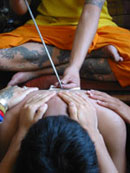How Is Your Heart?
If you listen to Thai conversations, there are two words that pop up frequently. The first is ‘gin,’ which means to eat or drink as most Thais like to chat about what they ate, what they will eat next, or what they could have eaten but chose not to eat. The second most frequently heard word is ‘jai,’ which means heart. Thais talk about their hearts more than any other part of the body. The state of someone’s heart (not head) is a direct reflection on his or her general well being. If you get a chance to listen to Thai pop on the radio, ‘jai’ (heart) will be mentioned most every song.
One of the first things a child will be taught is the practice of ‘kreng jai.’ ‘Kreng jai’ in a loose translation means ‘respectful to the heart.’ To be ‘kreng jai’ means to be considerate, unassuming and polite, especially to those of a higher social status. The Thai tendency not to rock the boat and keep things harmonious illustrates itself through ‘kreng jai.’
‘Kreng jai’ can express itself in some ways that can be tricky for a westerner to understand. If you offer a Thai friend a drink, they very often refuse it for the first few times. They are being ‘kreng jai’ and do not want to appear selfish or imposing, but will eventually accept the drink. ‘Kreng jai’ is expressed when one eats more rice and less meat during meals. By not asking for things and politely refusing things when they are offered, one is being ‘kreng jai.’
‘Hen jai’ means ‘see heart’ or to show sympathy. By sending an employee home early when they are sick, a boss is showing that he ‘hen jai’ his staff. Seeing a problem, recognizing it and trying to fix it are all part of ‘hen jai.’ So is accepting someone’s apology, forgiving an error or offering to assist someone in need of help.
‘Nam jai’ means ‘water heart’ or to act in a kind and generous manner. Thai people place a lot of value on having ‘nam jai’ and by sharing your food, bringing gifts of appreciation or offering to walk someone home, you are expressing ‘nam jai.’ Offering something without expecting anything for it in return is part of ‘nam jai.’
‘Jai dum’ or ‘heart black’ is perhaps the easiest of heart expressions to understand. A black heart means a lack of humanity is being shown. If one is forced to work on Saturday and Sunday for four months, the boss is certainly ‘jai dum.’ When compromises are ignored, feelings are not taken into consideration, selfish decisions are made, these are all signs that a person is ‘jai dum.’
‘Chuen jai’ or ‘joyful heart’ comes from feeling happy or refreshed. Receiving a gift, having your favourite snack offered to you, or enjoying a movie all qualify as ‘chuen jai.’ How to give someone a joyful heart depends on that individual. One person may feel ‘chuen jai’ when out dancing while another may feel ‘chuen jai’ when they receive flowers. Also, on a hot day, a cool, refreshing drink can make you feel ‘chuen jai,’ or refreshed. ‘Thuuk jai’ means ‘compatible heart’ or ‘compatible with your heart’. If someone gives you a gift and you absolutely love it, then that gift is ‘thuuk jai.’ You can also say that you are ‘thuuk jai’ towards the giver for choosing such a fitting gift. ‘Thuuk jai’ means that someone understands your heart and by doing so makes you feel very happy and pleased.
‘Khat jai’ or ‘blocked heart’ comes from feeling displeasure. If someone is not acting generously, considerately, or sympathetically they are ‘khat jai.’ Having a blocked heart means that good things cannot flow from it. When one is ‘ow jai’ or ‘considerate heart’ this means that they are pleased.
‘Jai yen’ means ‘heart cool’ and comes from keeping calm and not showing anger, otherwise known as ‘jai ron’ or ‘heart hot.’ A sure way to lose everyone’s respect in Thailand is by losing your cool. In the face of adversity and frustration, one should remain calm, cool and collected. (See back issues, 02 April 2001 http://www.bangkokpost.net/kat/archives/020401a.html)
Showing consideration of others is the key to expressing your good heart while keeping other people’s hearts happy. Being ‘sabai jai’ or ‘happy heart’ is the most important thing in life. If someone is working at a job they do not like and his or her heart is not happy, be sure that they are certain to leave even if the job pays well.
A happy heart is more important than money in the bank or a nice vacation. At the end of the day, Thais judge the quality of their life by the status of their hearts. In Thailand, the status of your heart in other people’s eyes will determine the amount of love, respect, cooperation and friendship you receive.
